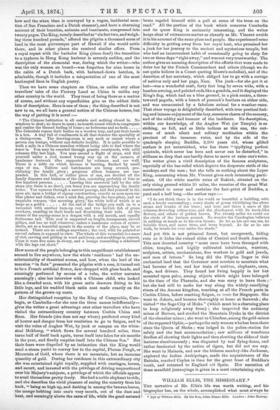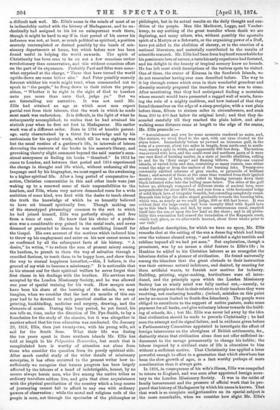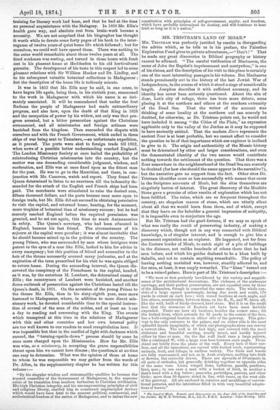WILLIAM ELLIS, THE MISSIONARY.*
THE narrative of Mr. Ellis's life was worth writing, and his biographer has, on the whole, accomplished what must always be * Life of William Ellis. By his Son, John Eimeo Ellis. London : John Murray.. .a difficult task well. Mr. Ellis's name in the minds of most of us is indissolubly united with the history of Madagascar, and he un- doubtedly had assigned to his lot no unimportant work there, though it might be hard to say if in that period of his career his influence was not, at least, as much political as spiritual, a position scarcely contemplated or desired possibly by the heads of mis- sionary departments at home, but which before now has been found useful in helping the world onwards. The spirit of -Christianity has been seen to be on not a few occasions rather revolutionary than conservative, and this without conscious effort on the part of its exponents. Probably Paul and Silas were some- what surprised at the charge, "These that have turned the world upside-down are come hither also." And Peter possibly scarcely forecast whither his words might tend, when commanded not to speak to "the people," he flung down to their rulers the propo- sition, " Whether it be right in the sight of God to hearken .unto you more than unto God, judge ye." But we .are forestalling our narrative. It was not until Mr. Ellis had attained an age at which most men expect partial rest from their labours, that the work in which he made most mark was undertaken. It is difficult, in the light of what he subsequently accomplighed, to realise that he had attained his sixtieth year when be first set foot in Madagascar. His earlier work was of a different order. Born in 1794 of humble parent- -age, early characterised by a thirst for knowledge and by his snthusiasm for his special work, which till he was eighteen Was but the usual routine of a gardener's life, in intervals of leisure devouring the contents of the books in his master's library, and provoking thereby slight comment beyond the said master's occa- sional annoyance at finding his books "thumbed." In 1812 he came to London, and between that period and 1814 experienced the change in thought and life which, without endorsing all the language used by his biographer, we must regard as the awakening to a higher spiritual life. After a long period of comparative in- -action, Christian communities in this and other lands were just waking up to a renewed sense of their responsibilities to the heathen, and Ellis, whose very nature demanded room for a wide ambition of some kind, was fired with the desire to teach abroad 'the truth the knowledge of which he so honestly believed
to have set himself spiritually free. Though making use of the stereotyped phraseology common to the sect to which he had joined himself, Ellis was perfectly simple, and free from a trace of cant. He knew that his choice of a profes- sion was a considerable step gained in the social scale, and never dreamed or pretended to dream be was sacrificing himself for the Gospel. His own account of the motives which induced him to throw up his employment and enter on his new career seems to us confirmed by all the subsequent facts of his history. "A desire," he writes, "to reduce the sum of present misery among the heathen, to preach to them the way of salvation through a crucified Saviour, to teach them to be happy here, and show them the way to eternal happiness hereafter,—this, I believe, is the ground of my wish to become a missionary." It is noticeable that in his utmost zeal for their spiritual welfare he never forgot that rst clause in his dealings with the heathen. His services were accepted by the London Missionary Society, and he was allowed one year of special training for his work. How meagre must have been his share of the learning of the schools, we may imagine, when we consider that the last six months of this one year had to be devoted to such practical studies as the art of printing, bookbinding, medicine and surgery, drawing, and the elements of music. During this busy period, he yet found, his son tells us, time, under the direction of Dr. Pye-Smith, to lay a foundation for the study of the classics, but it was altogether in another school that his true education was conducted. On January 23, 1816, Ellis, then just twenty-two, with his young wife, set sail for the South Seas. What their life was during the ten years spent in those southern islands Mr. Ellis has told at length in his Polynesian Researches, but much that is recapitulated here is worthy of attention not alone from those who consider the question from its purely spiritual side. After much careful study of the wider details of missionary enterprise, it has often occurred to the present writer how in- -sufficiently we recognise that human progress has been largely affected by the labours of a band of indefatigable, honest, by no means always heroic men, who live among the native tribes as ordinary travellers seldom live, and gain that close acquaintance with the physical peculiarities of the country which a long course -of journeying cannot fail to afford to any one with ordinary powers of observation ; while the moral and religious code of the people is seen, not through the spectacles of the philosopher or philologist, but in its actual results on the daily thought and con- dition of the people. Men like Medhurst, Legge, and Vander- kemp, to say nothing of the great traveller whose death we are deploring, and many others, who, without possibly the apostolic spirit of a Martyn or a Schwartz, or the organising power of a Duff, have yet aided in the abolition of slavery, or in the creation of a national literature, and materially contributed to the results of scientific research. Mr. Ellis had been from boyhood remarkable for his passionate love of nature, a taste his early experience had fostered, and his delight in the beauty of tropical scenery knew no bounds. He has left most vivid descriptions of the various spots he visited. One of these, the crater of Kirauea in the Sandwich Islands, we do not remember having ever seen described before. The way to it lay through scenes which even in their wonderful grandeur and diversity scarcely prepared the travellers for what was to come. After mentioning that they bad anticipated finding a mountain whose summit would have presented a ragged wall of scoria, form- ing the ruin of a mighty cauldron, and how instead of that they found themselves on the edge of a steep precipice, with a vast plain before them, fifteen to sixteen miles in circumference, and sunk from 200 to 400 feet below its original level ; and that they de- scended carefully till they reached the plain below, and after walking some distance came at length to the edge of the crater, Mr. Ellis proceeds :—
"Astonishment and awe for some moments rendered us mute, and, like statues, we stood fixed to the spot, with our eyes riveted on the abyss below. Immediately before us yawned an immense gulf, in the form of a crescent, about two miles in length, from north-east to south- west, nearly a mile in width, and apparently 800 feet deep. The bottom was covered with lava, and the south-west and northern parts of it were one vast flood of burning matter, in a state of terrific ebullition, rolling to and fro its fiery surge' and flaming billows. Fifty-one conical islands, of varied form and size, containing BO many craters, rose either round the edge or from the surface of the burning lake. Twenty-two constantly emitted columns of grey smoke, or pyramids of brilliant flame ; and several of these at the same time vomited from their ignited mouths streams of lava, which rolled in blazing torrents down their black indented sides into the boiling mass below. The sides of the gulf before us, although composed of different strata of ancient lava, were perpendicular for about 400 feet, and rose from a wide horizontal ledge of solid black lava of irregular breadth, but extending completely round. Beneath this ledge the sides sloped gradually towards the burning lake, which was, as nearly as we could judge, 300 or 400 feet lower. It was evident that the large crater had been recently filled with liquid lava up to this black ledge, and had, by some subterranean canal, emptied itself into the sea, or upon the low land on the shore ; and in all proba- bility this evacuation had caused the inundation of the Kapapala coast, which took place, as we afterwards learned, about three weeks prior to our visit."
After further description, for which we have no space, Mr. Ellis remarks that at the setting of the sun a dense fog which had hung over the volcano cleared away, "and unfolded a sight terrible and sublime beyond all we had yet seen." But exploration, though a prominent, was by no means a chief feature in Ellis's life ; in Huabine he added to his Christian labours as an evangelist the laborious duties of a pioneer of civilisation. He found universally among the islanders that the great obstacle to their instruction was their extreme natural indolence, and desired, by creating for them artificial wants, to furnish new motives for industry. Building, printing, sugar-making, horticulture were all intro- duced, and the principle upon which the London Missionary Society has so wisely acted was fully carried out,—namely, to make the people see that in their relation to their teachers they were receiving, not conferring benefits ; (indeed, mistakes on this point are by no means limited to South-Sea Islanders). The people were obliged to contribute to the support of native pastors, make some payment for all books, and give voluntary labour towards the build- ing of schools, &c. ; but Mr. Ellis was never led away by the idea that civilisation should be made to precede Christianity ; he had seen the attempt and its signal failure, and in evidence given before a Parliamentary Committee appointed to investigate the effect of foreign intercourse on the aborigines of British settlements, &c., distinctly states that civilisation alone does not offer sufficient in- ducement to the savage permanently to change his habits ; the labour imposed by a civilised state of life is obnoxious to him without a sufficient motive. That Christianity has applied a lever powerful enough to effect in a generation that which elsewhere has been the slow growth of ages, is a fact worthy perhaps of more consideration than it always gets.
In 1824, in consequence of his wife's illness, Ellis was compelled to return to Eagland, and was soon after appointed foreign secre- tary to the London Missionary Society. It was in the midst of family bereavement and the pressure of official work that be pre- pared that history of Madagascar by which his name is known. That that work is so complete andkxhaustive on its special subject is the more remarkable, when we consider how slight Mr. Ellis's training for literary work had been, and that he had at the time no personal acquaintance with the Malagasy. In 1839 Mr. Ellis's health gave way, and absolute rest from brain-work became a necessity. We are not surprised that his biographer has thought it worth while to devote some forty pages of his book to the inter- regnum of twelve years of quiet home life which followed ; but for ourselves, we could well have spared them. There was nothing to the outer world remarkable about those twelve years at all. The tired workman was resting, and turned in those hours with fresh zest in his pleasant home at Hoddesdon to his old horticultural pursuits. The development of his taste in this respect led to some pleasant relations with Sir William Hooker and Dr. Lindley, and to his subsequent valuable botanical collections in Madagascar ; but the description of the home life is tediously minute.
It was in 1853 that Mr. Ellis may be said, in one sense, to have begun life again, being then, in his sixtieth year, summoned to the work in Madagascar with which his name is so inti- mately associated. It will be remembered that under the first Radama the people of Madagascar had made extraordinary progress, and also how, upon the death of that King in 1828 and the usurpation of power by his widow, not only was that pro- gress arrested, but a bitter persecution against the Christians commenced, and all missionaries and foreign artisans were banished from the kingdom. Then succeeded the dispute with ourselves and with the French Government, which ended in three ships of war being sent to Tamatave,—an unfortunate expedition, as it proved. The ports were shut to foreign trade till 1852, when news of a possible better understanding reached England. The London Missionary Society at once hailed the probability of reintroducing Christian missionaries into the country, but the matter was one demanding considerable judgment, wisdom, and moderation, and Ellis was at once fixed upon as the fittest man for the post. He was to go to the Mauritius, and there, in con- junction with Mr. Cameron, watch and report. They found the Queen determined to listen to no overtures till the indemnity de- manded for the attack of the English and French ships had been paid. The merchants were stimulated to raise the desired sum, fifteen thousand dollars, and the ports became once more open to foreign trade, but Mr. Ellis did not succeed in obtaining permission to visit the capital, and returned home, bearing, for the moment, more trophies of botanical than of missionary success; but he had scarcely reached England before the required permission was granted, and he set out again, this time to reach Antananarivo in safety. The Queen's secretary, who had been educated in England, became his fast friend. The circumstances of his sojourn at the capital were peculiar ; it was almost inevitable that he should become mixed up in the politics of the country. The young Prince, who was surrounded by men whose intrigues were patent to the eyes of a man like Ellis, looked to him for advice in every emergency; but this position of friend and counsellor to the heir of the throne necessarily aroused many jealousies, and at the expiration of the term prescribed for his visit he was again obliged to return home. During the succeeding interval, the Queen dis- covered the conspiracy of the Frenchmen in the capital, headed, -as it was, by the notorious M. Lambert, the determined enemy of Ellis ; the countrymen of Lambert were banished, and another fierce outbreak of persecution against the Christians lasted till the Queen's death, in 1861. On the accession of the young Prince to the throne Mr. Ellis, then in his sixty-eighth year, once more hastened to Madagascar, where, in addition to more direct mis- sionary work, he devoted considerable time to the special instruc- tion of several of the sons of the nobles, and at least an h our a day to reading and conversing with the King. The events which transpired at this time in the relations of Madagascar with this and other countries and her own internal polity are too well known to our readers to need recapitulation here. It was impossible but that in the conflict of light with darkness which ensued, the " turning-upside-down " process should by some be once more charged upon the Missionaries. How far Mr. Ellis was wise, as a missionary, in accepting the grave responsibilities thrust upon him we cannot here discuss ; the questiori.is at no time one easy to determine. What was the opinion of those at home to whom he was responsible we may gather from the words of Dr. Allon, in the supplementary chapter he has written for this volume :—
"By his singular wisdom and statesmanlike qualities he became the trusted councillor of the Government of Madagascar, in tho supreme crisis of its transition from heathen barbarism to Christian civilisation. His high Christian integrity, and his uncompromising principles of civil and religious liberty, enabled him to counteract unprincipled devices which would have been fatal to the nascent political, commercial, and ecclesiastical freedom of the nation of Madagascar, and to imbue the new
constitution with principles of self-government, equity, and freedom, which have probably determined its destiny, and will continuo to bear fruit so long as it is a nation."




































 Previous page
Previous page